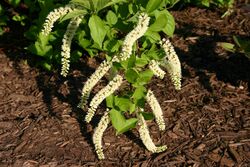Biology:Itea virginica
| Itea virginica | |
|---|---|

| |
| Flowering branch | |
| Scientific classification | |
| Kingdom: | Plantae |
| Clade: | Tracheophytes |
| Clade: | Angiosperms |
| Clade: | Eudicots |
| Order: | Saxifragales |
| Family: | Iteaceae |
| Genus: | Itea |
| Species: | I. virginica
|
| Binomial name | |
| Itea virginica | |
Itea virginica, commonly known as Virginia willow or Virginia sweetspire, is a small North American flowering shrub that grows in low-lying woods and wetland margins. Virginia willow is a member of the Iteaceae family, and native to the southeast United States.[2] Itea virginica has small flowers on pendulous racemes.[3]
Depending on location, the species will bloom in late spring to early summer. It prefers moist rich soil, but it can tolerate a wide range of soil types. When Virginia willow is used in horticulture it can form large colonies and may form dense root suckers, making the shrub hard to remove.
Description
Itea virginica is a deciduous shrub that grows to 2.5 m (8.2 ft) tall and 1.5 m (4.9 ft) broad, with alternate, simple leaves on arching stems. The flowers are white or cream, borne in downward pointing slightly curved spikes, in summer. It is a multi-stemmed, suckering and colonizing plant, with the stems branching infrequently except at the tops. In favorable conditions it may become semi-evergreen. The leaves turn shades of red in fall (autumn). It is hardy down to at least −15 °C (5 °F).[4]
Conservation
Itea virginica is listed as "apparently secure" overall by NatureServe.[1] However, it is considered to be critically imperiled in Pennsylvania, Indiana and Oklahoma.[1]
Taxonomy
Itea virginica belongs to the Iteaceae, a family of deciduous and evergreen shrubs.[5] It is the only species in its genus in North America; most Itea species are from east Asia. Some authors have historically placed Virginia sweetspire in the Grossulariaceae or Saxifragaceae families.[6]
Horticulture
In cultivation in the UK the cultivar ‘Henry’s Garnet’ has gained the Royal Horticultural Society’s Award of Garden Merit.[7][8] Itea virginica is used as a native ornamental landscape plant in North America, and numerous cultivars have been named.[9] The flowers attract pollinators, and the shrub can be used for erosion control.[10]
References
- ↑ 1.0 1.1 1.2 NatureServe (7 April 2023). "Itea virginica". Arlington, Virginia: NatureServe. https://explorer.natureserve.org/Taxon/ELEMENT_GLOBAL.2.155413/Itea_virginica.
- ↑ "Home | North Carolina Extension Gardener Plant Toolbox". https://plants.ces.ncsu.edu/.
- ↑ "Itea virginica 'Henry's Garnet' - Plant Finder". https://www.missouribotanicalgarden.org/PlantFinder/PlantFinderDetails.aspx?kempercode=d590#:~:text=Itea%20virginica,%20commonly%20called%20Virginia,deciduous%20shrub%20with%20arching%20branches.&text=Features%20fragrant,%20tiny%20white%20flowers,late%20spring%20to%20early%20summer..
- ↑ Brickell, Christopher, ed (2008). The Royal Horticultural Society A-Z Encyclopedia of Garden Plants. United Kingdom: Dorling Kindersley. p. 582. ISBN 9781405332965.
- ↑ "Plants Profile for Itea virginica (Virginia sweetspire)". https://plants.usda.gov/core/profile?symbol=ITVI.
- ↑ Radford, Albert E. (1968). Manual of the vascular flora of the Carolinas. Ahles, Harry E., Bell, C. Ritchie.. Chapel Hill: University of North Carolina Press. ISBN 0-8078-1087-8. OCLC 355003. https://www.worldcat.org/oclc/355003.
- ↑ "RHS Plantfinder - Itea virginica 'Henry's Garnet'". https://www.rhs.org.uk/Plants/118050/i-Itea-virginica-i-Henry-s-Garnet/Details. Retrieved 13 March 2018.
- ↑ "AGM Plants - Ornamental". Royal Horticultural Society. July 2017. p. 56. https://www.rhs.org.uk/plants/pdfs/agm-lists/agm-ornamentals.pdf. Retrieved 14 March 2018.
- ↑ "Virginia Sweetspire" (in en-US). Clemson University. December 17, 2019. https://hgic.clemson.edu/factsheet/virginia-sweetspire/.
- ↑ "Home & Garden Information Center". Clemson University. https://hgic.clemson.edu/.
External links
- Proven Winners [1]
Wikidata ☰ Q469091 entry
 |


